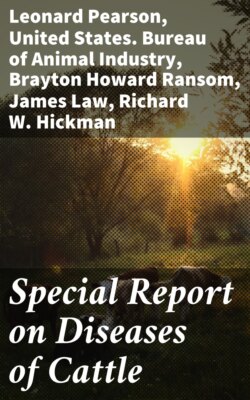Читать книгу Special Report on Diseases of Cattle - Lowe - Страница 131
На сайте Литреса книга снята с продажи.
LARYNGITIS (SORE THROAT).
ОглавлениеAn inflammation of the mucous membrane lining the larynx is known as laryngitis. It may be either a primary or a secondary disease, complicated or uncomplicated. In the majority of cases it is attributable to some form of exposure, a sudden change from warm to cold surroundings, or exposure to cold storms. It may also result from inhaling irritating gases or from external violence. In an acute attack of laryngitis there is an elevation of temperature, pain on pressure over the region of the larynx, violent paroxysms of coughing, difficult and noisy respiration. The nostrils are dilated, the nose extended, and the animal has a frightened expression. There is marked difficulty in swallowing.
Treatment.—Treatment consists of fomentations and hot applications over the throat. Stimulating liniments, mustard mixed with cold water and well rubbed in with a stiff brush, or other forms of counterirritation may be applied in severe cases. Hot inhalations should be frequently resorted to, and often afford much relief to the suffering animal. In this disease medicines should be given so far as possible in the form of electuaries (soft solid) on account of the difficulty of deglutition. Large drafts of medicines have a tendency to produce violent spells of coughing, and in this way retard recovery. The subjoined formula for an electuary will be found to answer the purpose in ordinary cases: Chlorate of potassium, pulverized, 8 ounces; fluid extract of belladonna, 2 ounces; powdered opium, 1 ounce; powdered licorice root, 8 ounces; sirup, sufficient quantity; mix. Place a small tablespoonful of the mixture frequently on the tongue or back teeth. Or the following may be used instead: Aloes, powdered opium, and gum camphor in equal parts; mix. Rub an ounce on the molar teeth every four or five hours. The bowels should be kept open and the diet should be such as the patient can easily swallow. Warm, sloppy mashes, boiled oatmeal gruel, linseed tea, and the like are the most suitable substances. If suffocation be threatened during the course of the disease, tracheotomy should be performed without delay. The details of the operation are fully described under the head of "Surgical operations." (See p. 289.)
When the disease assumes a chronic form, strong counterirritation is indicated. A cantharides blister may be applied, or the following ointment used: Biniodid of mercury 1 part, lard 6 parts; mix. In some cases it will be found necessary to repeat the application.
